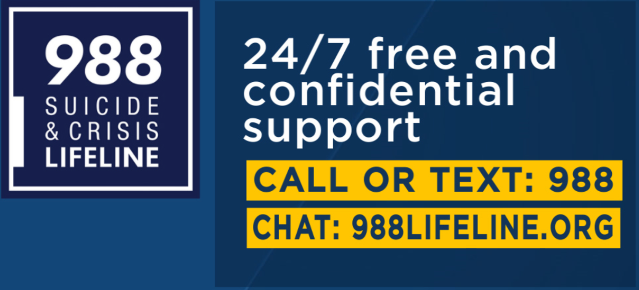
The North Carolina Department of Health and Human Services has launched a performance dashboard for the 988 Suicide and Crisis Lifeline to highlight how the suicide and crisis lifeline is being used in North Carolina.
The 988 Suicide and Crisis Lifeline connects North Carolinas via call, chat or text to a trained crisis counselor who will listen, offer support and provide community resources 24 hours a day, 7 days a week. 988 is a state-federal partnership between NCDHHS and the U.S. Substance Abuse and Mental Health Service Administration. It was implemented nationwide in July of 2022.
“North Carolina is a national leader in operationalizing 988 which is a critical part of the state’s crisis system,” said NC Health and Human Services Secretary Kody H. Kinsley. “With shortened response times and more connections made, 988 is a powerful tool in helping to get North Carolinians the support and resources they need when they need them.”
The dashboard shows North Carolina is successfully meeting demand for the 988 service. North Carolina outperforms national averages in several key areas. For example, it takes 14 seconds to answer calls in North Carolina whereas the national average is 39 seconds. North Carolina also answers 98% of all calls received, compared to the national average of 90%. And the dashboard indicates a 25% increase in utilization over the past year, which shows the service is playing a valuable role for North Carolinians in need of mental health resources.
The 988 performance dashboard provides useful information on contact volume, answer rates, speed of answer, age ranges and reasons for calling. It also indicates call volume for specific populations, including North Carolinians who reach out to the Spanish call center, Veterans Crisis Line and the LGBTQ+ youth and young adult line (e.g., the Trevor Project Line). Data shared in the dashboard does not include personal or confidential health information.
“Understanding how this service is being used and by whom are keys to understanding where our crisis system is working well and where it needs to be improved,” said Kelly Crosbie, MSW, LCSW, Director of the NCDHHS Division of Mental Health, Developmental Disabilities, and Substance Use Services. “The 988 dashboard will help us build the accountability necessary to ensure people get care they need when and where they need it.”
988 is an important component of our overall crisis system. The new state budget invests $131 million to expand and strengthen crisis services in North Carolina. In addition to 988, several key community-based crisis services are funded, such as:
- Mobile Crisis Teams: Immediate, on-site support for people experiencing a mental health and/or substance use crisis
- Facility-Based Crisis Centers and Drop-in Centers: Community-based crisis centers for individuals experiencing a behavioral health or substance use crisis
- Non-Law Enforcement Pilot Program: Transportation services to psychiatric facilities that do not involve law enforcement
- Behavioral Health (BH) SCAN: Statewide bed registry that helps hospitals and other providers facilitate and track referrals and access to inpatient, crisis, residential and community levels of care
The department is currently developing its implementation plan for these investments and is keeping people informed through a monthly webinar titled “Side By Side.” It is hosted by the Division of Mental Health, Developmental Disabilities, and Substance Use Services. For more information, or to register as an attendee for one of these webinars, please visit the Side By Side meeting registration link.
988 is available to anyone, anytime. If you or someone you know is struggling or in crisis, help is available. Call or text 988 or chat 988lifeline.org. Individuals who speak Spanish can now connect directly to Spanish-speaking crisis counselors by calling 988 and pressing option 2, texting “AYUDA” to 988, or chatting online at 988lineadevida.org or 988Lifeline.org.
